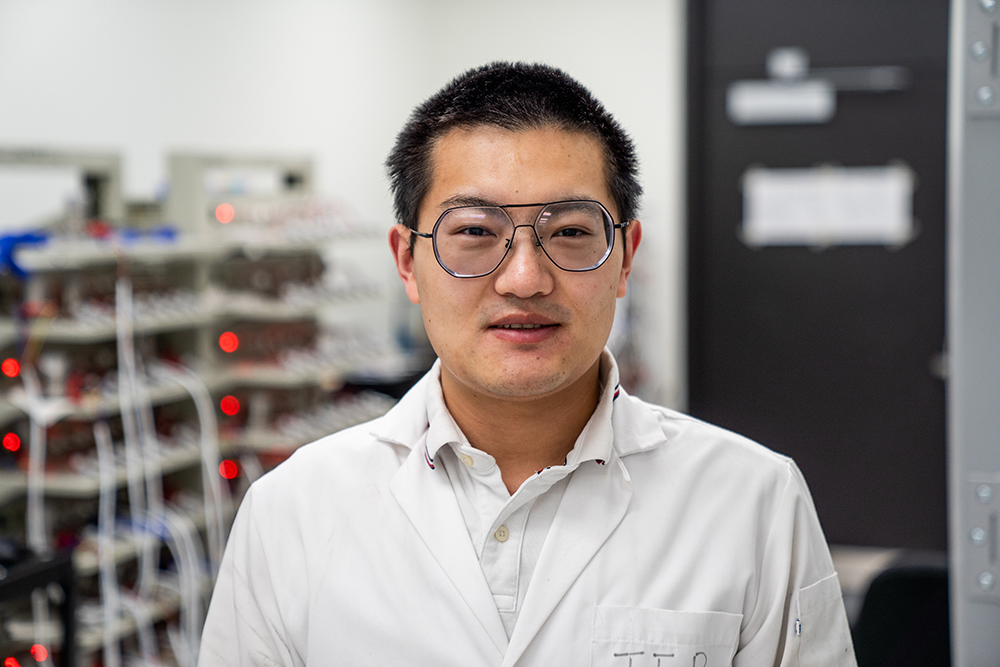Media
Contact
Communications Specialist
Faculty of Engineering
Spencer Engineering Building
Room 2072
Western University
Tel: 519-661-2111 ext. 87015
Email: engineeringcomms@uwo.ca
Western Engineering postdoc receives Banting Postdoctoral Fellowship

Western Engineering's Jian Peng is a 2024 recipient of the Banting Postdoctoral Fellowship awarded by the Natural Sciences and Engineering Research Council. (Jacob Arts photo)
Jian Peng, a postdoctoral associate in the department of mechanical and materials engineering at Western University is one of 24 recipients of the Banting Postdoctoral Fellowship awarded by the Natural Sciences and Engineering Research Council.
The Fellowship is the most prestigious postdoctoral award in Canada and provides funding to the very best postdoctoral applicants, both nationally and internationally, who will positively contribute to the country's economic, social, and research-based growth.
“Receiving this award fills me with immense excitement and gratitude, as it opens the door for me to collaborate with leading scientists in the realm of battery technology at a premier university,” said Peng.
“This achievement marks a significant milestone in my career, granting me the extraordinary opportunity to develop next-generation batteries within world-class laboratories, all under the esteemed guidance of Professor Xueliang (Andy) Sun,” he added.
Peng and his team are working on creating a new type of rechargeable battery that could play a crucial role in fighting global climate change. These batteries are designed to store large amounts of energy from renewable sources like the sun and wind, which don't always produce energy. By making these batteries cost-effective, capable of storing a lot of energy and very safe to use, he hopes to make it easier for the world to rely more on renewable energy and less on fossil fuels that harm the environment.
“Jian Peng's achievement as the first Banting Postdoctoral Fellowship recipient at Western Engineering underscores the faculty's commitment to fostering ground-breaking research,” shared Lars Rehmann, associate dean, graduate and postdoctoral studies, Western Engineering. “His dedication and scholarly excellence exemplify the spirit of innovation that drives our academic community forward.”
Research Excellence
Peng’s research is pivotal because it aims to develop a safer, more affordable, longer-lasting and energy-efficient alternative to the widely used lithium-ion batteries in large-scale energy storage systems.
“By successfully creating all-solid-state sodium-ion batteries, we could revolutionize how energy is stored, making it a crucial step towards building a new era of energy storage systems. The implications of this project extend far beyond just technological advancements. It positions Canada to make a significant leap in the realm of large-scale energy storage, which is fundamental for the growth and reliance on renewable energy sources within the country and potentially across the global market,” he said.
The knowledge and findings from his research are expected to enhance the quality of education in this field to provide a rich source of academic material.
Peng's remarkable academic journey is a testament to his exceptional research prowess and scholarly dedication. With over 80 peer-reviewed publications, including 30 first author/corresponding author papers in prestigious journals, Peng has established himself as a leader in his field.
His impressive citation count of nearly 4400 and an H-index of 38 reflect the global impact of his work, surpassing expectations for his career stage.
In a letter, Canada Research Chair (Tier 1) in Nanomaterials for Clean Energy, Sun, who also holds Fellowships in the Royal Society of Canada and the Canadian Academy of Engineering, posited that “Among Peng’s notable contributions is his development of a universal self-healing method for synthesizing various Prussian blue analogs, addressing critical challenges in cathode materials for sodium-ion batteries.”
Sun hails Peng as a top-level PhD student who demonstrates a great drive for research excellence and self-improvement in the leadership domain. He noted that by the end of his PhD study in 2022, Peng had played a central role in developing sodium-ion batteries, designing the facilities for advanced characterizations and engineering practical pouch cells highlighting his collaborative approach and ability to translate his knowledge to a variety of next-generation battery systems.
Sun contends that advanced energy storage technology is crucial for mitigating global warming risk by reducing greenhouse gas emissions from the internal combustion engine.
“Nowadays most traditional automakers such as Toyota and General Motors are exploring next-generation energy storage technology with higher energy density and much-improved safety… developing next-generation solid-state sodium-ion batteries proposed in Jian’s research is along the lines of this direction and will certainly position Jian for a high-impact research career in the energy storage field,” he said.
He added: “The proposed solid-state sodium-ion batteries have even higher gravimetric and extremely lower-cost content (no expensive transition metals) than traditional lithium-ion batteries, which further increases their potential for commercial application. Compared to commercial lithium-ion batteries, the proposed solid-state sodium-ion batteries with innovative solid-state electrolytes are theoretically more stable and feasible.”
The exploration of Peng’s research direction is critical to solving many of the issues with commercial lithium-ion batteries, especially for grid-scale energy storage system and Peng aims to leverage his laboratory findings to bring practical, reliable products to the market.
“The goal is not only to contribute to the advancement of battery technology but also ensure that our research has a tangible impact on Canadian society and even the whole world,” he concluded.

